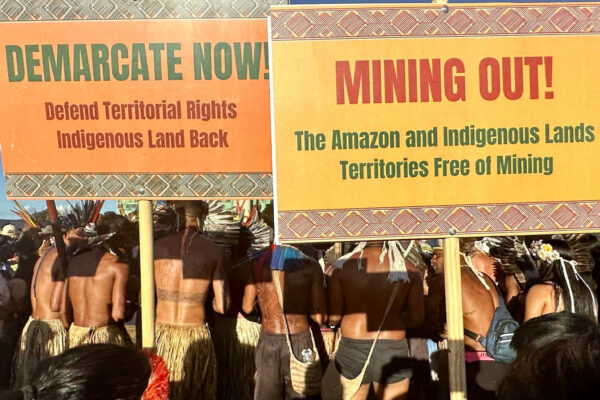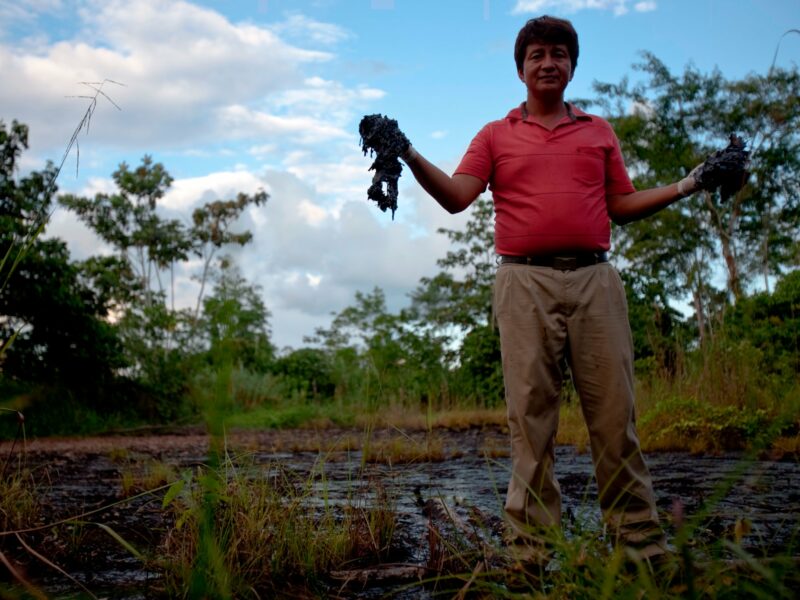Midland, TX – Chevron CEO John Watson faced a firestorm of criticism over the company’s expanding Ecuador liability at the company’s annual meeting today from a group of institutional investors, one of whom accused the oil executive of “materially mishandling” the case. Faced with mounting opposition from shareholders and allegations of violation of federal law for bribing a witness, Watson resorted to reciting complete falsehoods, clinging to “alternative facts” and cutting off the microphones.
Clearly a sharp rebuke to Watson, all three shareholder resolutions presented by investors motivated by the Ecuador liability received significant support – with one receiving a whopping 39% of shareholder votes, which represents billions in assets. Normally, shareholder resolutions that receive anything over 10% of shareholder votes are considered successful. Yet, faced with these facts, Watson incorrectly responded, “shareholders have universally supported Chevron management in this case.”
Watson and his management team vigorously opposed the three shareholder resolutions critical of their actions in the Ecuador case. The resolution that received the most votes, put forth by Zevin Asset Management, called for Watson to be removed as Chairman of Chevron’s Board of Directors in part due to his mishandling of the case:
Proponents are concerned that Chevron’s management has materially mishandled legal matters brought against the Company by communities in Ecuador – in ways that increased liabilities for the Company, currently amounting to more than $9 billion. Moreover, proponents are concerned about the adequacy of the Company’s disclosure of those risks to shareholders. Finally, proponents are deeply troubled that the Company has evidently sought to intimidate longstanding shareholders who questioned the Company’s approach to these issues.
A second, calling for greater shareholder power to call special meetings, won 31% of the vote. The third, calling for the appointment of a director with expertise in environmental liability, won 20%.
“Today was a resounding victory for the rainforest communities of Ecuador who are on a historic path to hold Chevron accountable for its toxic dumping and fraudulent cover-up in Ecuador,” said Simon Billenness, who works as a liaison between the affected communities and institutional shareholders.
Chevron’s Ecuador liability stems from findings by three levels of courts in Ecuador in 2013 that the oil giant deliberately dumped billions of gallons of toxic waste into the rainforest, decimating indigenous groups and causing an outbreak of cancer that has killed or threatens to kill thousands of innocent civilians. Chevron operated in Ecuador under the Texaco brand from 1964 to 1992.
“It’s no surprise that Watson, who has grown weary of being barraged about the Ecuador case year after year, grew frustrated once again and made outright false claims in an effort to defend himself and his management team from criticism,” said Paul Paz y Miño, Associate Director at Amazon Watch, a U.S. based NGO that for years has supported the victims of Chevron’s toxic legacy. “He even went so far as to claim that the only legal decision in favor of the Ecuadorians was the initial verdict in Ecuador – a patently false claim.”
Chevron’s strategy in the Ecuador case has long been to attempt to demonize New York attorney Steven Donziger, who represents the Ecuadorians, and Watson’s statements today demonstrates that he still clings to this strategy. In actuality, every decision since the initial Ecuadorian verdict, aside from Chevron’s own retaliatory suit brought under the U.S. Racketeer Influenced and Corrupt Organizations Act – known as RICO – which refused to consider evidence of the contamination and specifically did not exonerate Chevron in Ecuador – has thus far gone against the oil company.
“The walls continue to close in on Watson and it’s never been more obvious than at today’s meeting. Watson can turn off the mic in Texas, but Chevron will not have that luxury in Canada, where it faces another enforcement proceeding in an Ontario court this October,” said Kevin Koenig, Amazon Watch Ecuador Program Director.
What may have also outraged Watson was the fact that, just prior to the shareholder meeting, hundreds of thousands of people engaged with social media traffic calling for Chevron’s Board of Directors to bring Watson to account for spending millions of shareholder funds to bribe a federal witness, Alberto Guerra. Guerra was Chevron’s key witness in its retaliatory racketeering suit against the Ecuadorians and their lawyers. Chevron paid Guerra $2 million and its lawyers coached him for 53 days before putting him on the stand in U.S. courts, where forensic evidence and his later admissions prove he lied repeatedly to help Chevron evade paying the Ecuador judgment. This is not only a serious violation of ethics and a misuse of shareholder funds, but also a federal crime. According to Guerra himself, the exorbitant payments he received were arranged directly in a meeting in Chicago by Randy Mastro, Chevron’s lead outside counsel at the law firm of Gibson, Dunn & Crutcher.
Chevron Board Member and former U.S. Ambassador to China Jon Huntsman was also targeted in the social media action, though he has remained silent on the Ecuador matter to date. It has been reported that Huntsman is Donald Trump’s first pick for U.S. Ambassador to Russia.
Amazon Watch and the Rainforest Action Network signed a brief on May 1st to the U.S. Supreme Court, filed by EarthRights International, which details the fabrication of evidence by Chevron with the help of Guerra. Chevron’s reliance on the discredited Guerra is likely to backfire in Canada, where it will be called to defend Guerra’s statements and explain not only his lack of physical evidence but his admission under oath to having lied for Chevron specifically to get a larger payout from the oil giant. Chevron’s sole victory in the Ecuador matter, the RICO suit that offered no actual legal remedy to help the company escape a $9.5 billion liability, has fallen apart in the wake of Guerra’s admission of lying and actual forensic evidence, disproving Chevron’s key claim that the original Ecuadorian decision was ghostwritten.
“While Watson buries his head in the sand, the irrefutable facts are Chevron’s reputation continues to worsen and pressure from shareholders and the international community continues to grow. The question remains how much longer the board will allow him to cling to weak lies to defend illegal and unethical actions that are likely to cost billions of shareholder funds,” said Paz y Miño.













